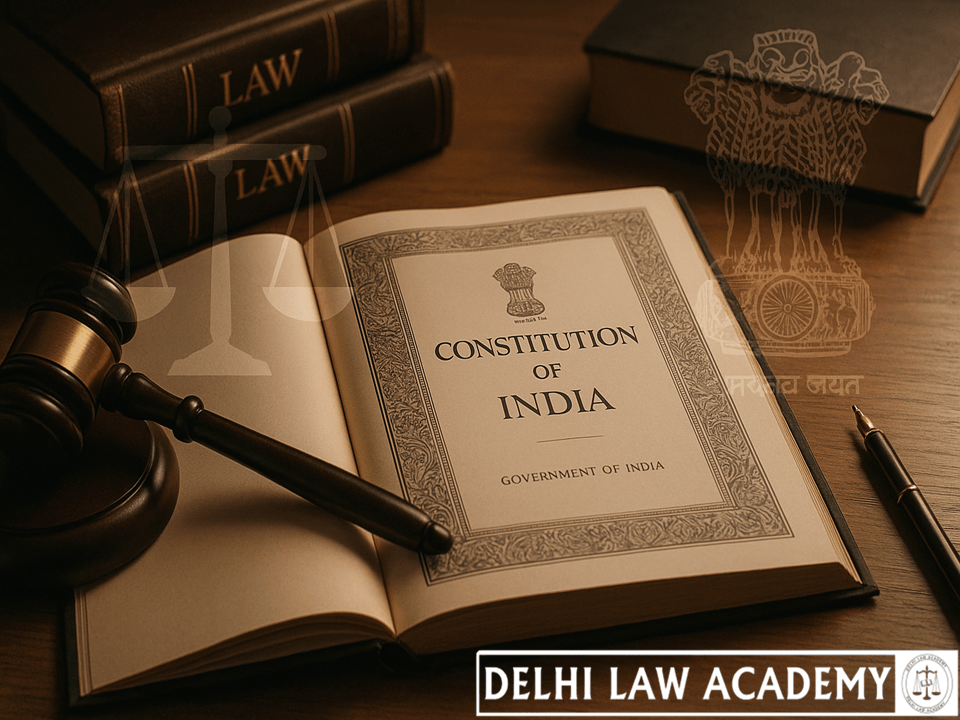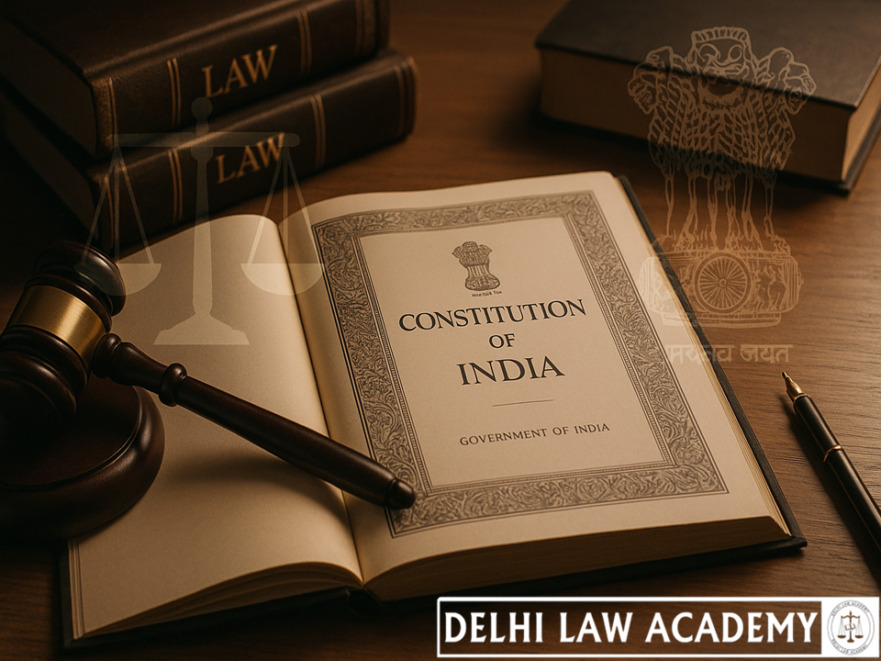
📘 S.P. Anand v. H.D. Deve Gowda (1997 SC) — Article 75(5)
TOPIC:
• Can a person who is not a member of either House of Parliament be appointed as the Prime Minister of India?
*****************
Delhi Law Academy Jaipur presents below for aspirants of RJS, DJS, PCS (J) and other Judicial Services throughout India a summarized version of the Supreme Court judgment in the case of S.P. Anand v. H.D. Deve Gowda [1997] interpreting the Constitutional provisions contained in Article 75(5).
***************
⚖️ Case Law: S.P. Anand v. H.D. Deve Gowda (1997 SC)
S.P. Anand v. H.D. Deve Gowda [1997 SC]
On a plain reading of Article 75(5) it is obvious that the Constitution-makers desired to permit a person who was not a member of either House of Parliament to be appointed a Minister for a period of six consecutive months and if during the said period he was not elected to either House of Parliament, he would cease to be a Minister. This becomes clear if one were to read the debates of the Constituent Assembly (the draft Articles were 62 and 144 for the present Articles 75 and 164). Precisely on the ground that permitting such persons to be appointed Ministers at the Union or State levels would “cut at the very root of democracy”, an amendment was moved to provide: “No person should be appointed a Minister unless at the time of his appointment, he is elected member of the House:” which amendment was spurned by Dr Ambedkar.
Now Article 75(1) envisages a Council of Ministers with the Prime Minister at the head to aid and advise the President, and the latter is expected to act in accordance with such advice but if he has any reservations he may require the Council of Ministers to reconsider such advice. Thus, the President has to act in accordance with the advice of the Council of Ministers as a body and not go by the advice of any single individual. Only a person who, the President thinks, commands the confidence of the Lok Sabha would be appointed the Prime Minister who in turn would choose the other Ministers. The Council of Ministers is made collectively responsible to the House of the People. The form of the oath prescribed in the Third Schedule under Article 75(4) is the same for the Prime Minister as well as a Minister. In other words, the Constitution does not draw any distinction between the Prime Minister and any other Minister in this behalf. This is not to say that the Prime Minister does not enjoy a special status; he does as the head of the Council of Ministers but the responsibility of the Council of Ministers to the House of the People is collective.
Besides, the caption of Article 75 as a whole is “Other provisions as to Ministers”. No separate provision is to be found dealing with the appointment of the Prime Minister as such. Therefore, even though the Prime Minister is appointed by the President after he is chosen by such number of members of the House of the People as would ensure that he has the confidence of the House and would be able to command the support of the majority, and the Ministers are appointed on the advice of the Prime Minister, the entire Council of Ministers is made collectively responsible to the House and that ensures the smooth functioning of the democratic machinery. If any Minister does not agree with the majority decision of the Council of Ministers, his option is to resign or accept the majority decision. If he does not, the Prime Minister would drop him from his Cabinet and thus ensure collective responsibility.
Therefore, even though a Prime Minister is not a member of either House of Parliament, once he is appointed he becomes answerable to the House and so also his Ministers and the principle of collective responsibility governs the democratic process. Even if a person is not a member of the House, if he has the support and confidence of the House, he can be chosen to head the Council of Ministers without violating the norms of democracy and the requirement of being accountable to the House would ensure the smooth functioning of the democratic process. We, therefore, find it difficult to subscribe to the petitioner’s contention that if a person who is not a member of the House is chosen as Prime Minister, national interest would be jeopardised or that we would be running a great risk.
The English convention that the Prime Minister should be a member of either House, preferably House of Commons, is not our constitutional scheme since our Constitution clearly permits a non-member to be appointed a Chief Minister or a Prime Minister for a short duration of six months. That is why in such cases when there is any doubt in the mind of the President, he normally asks the person appointed to seek a vote of confidence of the House of the People within a few days of his appointment.
By parity of reasoning if a person who is not a member of the State Legislature can be appointed a Chief Minister of a State under Article 164(4) for six months, a person who is not a member of either House of Parliament can be appointed Prime Minister for the same duration. We must also bear in mind the fact that conventions grow from long standing accepted practices or by agreement in areas where the law is silent and such a convention would not breach the law but fill the gap. If we go by that principle, the practice in India has been just the opposite. In the past, persons who were not elected to State Legislatures have become Chief Ministers and those not elected to either House of Parliament have been appointed Prime Ministers. We are, therefore, of the view that the British convention to which the petitioner has referred is neither in tune with our constitutional scheme nor has it been a recognised practice in our country.
With these observations we dismiss the petition.
* * * * *
📘 Stay Ahead with Delhi Law Academy!
Get access to free monthly current affairs, read our insightful blogs,
and explore free study resources prepared by experts at DLA Jaipur. 🚀
Frequently Asked Questions (FAQs)
Contact us
📍 Delhi Law Academy – Jaipur Branch
6C, Tower 2, Coaching Hub, Pratap Nagar, Jaipur – 302033
📞 Phone:
+91 9911916552
+91 8447285606
✉️ Email:
contactus@delhilawacademy.com

